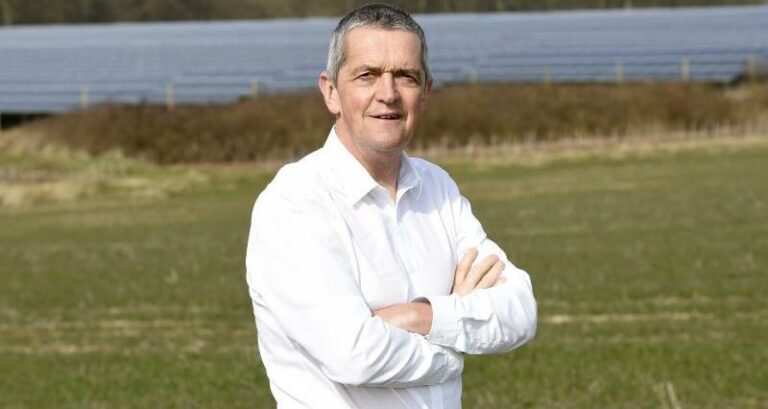The NFU has committed to making agriculture net zero by 2040, ten years earlier than government targets. Deputy president Guy Smith is heading up the net zero project. But, as he told David Burrows, despite the ambitious target, the union is struggling against misinformation about meat.
The vegan lobby has recently turned up the heat on livestock production and there’s a feeling that the media have been all too keen to jump on the bandwagon.
The pervading message is: meat production is very bad for the environment, so give it up and you are helping to save the planet. If only it were that simple.
“We think there is some pretty twisted analysis going on trying to suggest to consumers that the easiest way to stop climate change is to stop eating meat,” says Guy Smith, deputy president of the NFU, during an interview at the union’s headquarters in London. “You can’t generalise this. Different ways of producing meat have different carbon footprints.”
The focus in the press and social media is very much on red meat, which has the biggest carbon footprint. Poultry’s lower emissions profile has actually allowed the sector to duck some of the rocks being thrown in the general direction of livestock farming.
“[Other producers] certainly haven’t found themselves in the spotlight [as much as the red meat ones have],” Smith said, “and that comes back to vegans hijacking the argument. But all food production has a carbon footprint.”
Weighing up the benefits of one meat over another is incredibly complicated, especially when some of the science isn’t yet settled. One emerging bone of contention relates to the accounting of greenhouse gas emissions, and whether the weighting methane receives should be adjusted: it’s a far more powerful gas than carbon but it doesn’t hang around in the atmosphere anywhere near as long as carbon.
Smith is drawn to the latter school of thought (methane accounted for 57% of UK agricultural emissions in 2017) but admitted that emissions accounting is “a bit of a morass”. Throw in different production systems and it becomes thornier still. The intensive versus extensive debate, for example, is far from over: “We need some clarity on which systems have the lowest carbon footprints,” said Smith.
Farmers have certainly struggled to cut back carbon: agricultural emissions are 16% below 1990 levels but there has been no progress in reducing them since 2008. Smith said there isn’t any sign yet of a market stimulus to kickstart the process: consumers are not really seeking out low-carbon food, let alone paying a premium for it, he suggested.
There would also be trade-offs to be made. The market for free-range eggs, for example, has been transformed through consumer demand and shoppers’ willingness to dip into their pockets for higher welfare products; but free-range eggs can come with a bigger carbon footprint than those from intensive systems.
Start looking at this and your head soon starts to spin.
What we do know is that UK farms currently produce 45.6m tonnes of CO2e per year – about 10% of the country’s total – and the NFU reckons these can all be reduced or removed within the next two decades.
How? “We need to step up to find ways of reducing greenhouse gas emissions in the way we produce food, sequester more carbon on farm and contribute more to the bioeconomy,” Smith says.
These are the three strands to the union’s ‘net zero by 2040’ plan and mean there would be no need to reduce meat consumption, according to the NFU.
Smith said: “The easiest way for me, as a practical farmer, to reduce my carbon footprint is to walk away from production. The consequence of that is going to be importing food from other parts of the world – so you could be reducing production [but] making global situation worse as you are offshoring carbon.”
Environmental impact: It’s complicated…
Meat may be painted as a major source of carbon emissions, but a study by WWF-UK, published in March 2018, showed that a chicken tikka masala had a lower carbon footprint than a cheese ploughman’s – 2kgCO2e (carbon dioxide equivalent) versus 2.6kgCO2e. Lamb stew weighed in at 5.6kgCO2e per portion. The findings were a pat on the back for poultry producers, but a kick in the teeth for their lamb counterparts. As NFU Cymru noted: “The report does not acknowledge the many benefits to biodiversity of grazed livestock, nor does it note the possible benefits of the carbon stored in our grasslands, hedges and farm woodlands.”
And it’s important to look beyond carbon. Research published in October, led by the University of York, linked chicken and pork consumption with biodiversity loss in the Cerrado, Brazil (which is home to 5% of the world’s species). In major European markets like the UK, consumption of non-beef meat products fed on soy from the Cerrado had a bigger impact on biodiversity than consumption of soy-fed beef products; around 30% of the impact was linked to other meats, compared to 10% to 12% for beef.


